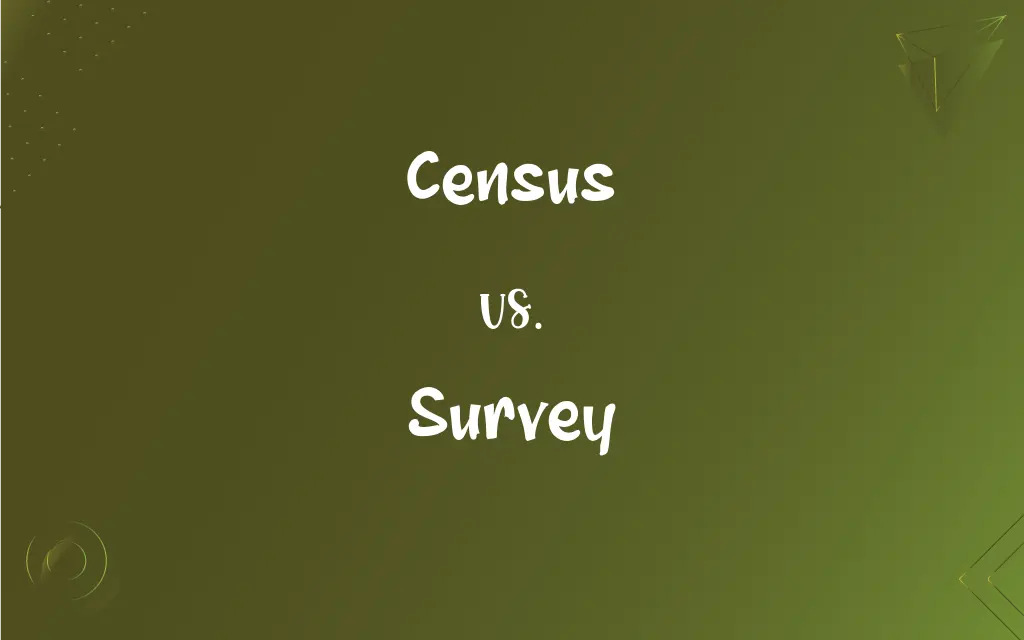Census vs. Survey: What's the Difference?
Edited by Aimie Carlson || By Harlon Moss || Updated on October 6, 2023
A census gathers data from every individual in an entire population, while a survey collects data from a subset or sample of the population, aiming to infer about the whole.

Key Differences
A census refers to a comprehensive data collection process that aims to gather information from every member of a population or a specific group. The very nature of a census is to be exhaustive, ensuring that every individual, household, or unit is accounted for, which allows for a very detailed and accurate data set. A survey, on the other hand, typically involves collecting data from a selected sample of the population, not the entirety of it. Surveys might employ various sampling techniques to ensure that the sample is representative of the whole population, allowing for generalizations about the larger group.
In practical applications, a census is often used to gather essential demographic information within a country, providing accurate and extensive data that can inform national policies, allocation of resources, and government representation. Whereas a survey might be utilized to quickly gather information on specific topics, like public opinion or consumer preferences, which can be analyzed and generalized to understand the larger population's characteristics or tendencies.
The methodology of a census tends to be more rigid and standardized due to the necessity of collecting comparable data from all participants. In contrast, surveys might have more flexibility in their approach, allowing researchers to use different types of questions or formats, depending on their objectives and the nature of the information they seek. While both census and survey are pivotal tools in research and data collection, the contexts in which they are used and the methodologies they employ can vastly differ.
A noteworthy advantage of a census is its ability to provide a highly accurate and comprehensive data set that allows for detailed analyses of the entire population. In contrast, a significant advantage of a survey is its cost-effectiveness and efficiency, enabling researchers to gather useful data without needing to engage with the entire population. Both approaches come with their own set of challenges and advantages that researchers must weigh based on their specific objectives and available resources.
Despite their differences, both census and survey play crucial roles in informing decision-making in various sectors, including government, business, and academia. The comprehensive data derived from a census can lay the foundation for significant policy-making and resource allocation, while the more targeted and specific insights derived from surveys can help understand particular phenomena or trends, thereby informing strategic decisions and policy developments.
ADVERTISEMENT
Comparison Chart
Data Collection Scope
Whole population
Subset/sample of the population
Cost and Time
Generally high
Relatively lower
Accuracy
Very high (no sampling error)
Subject to sampling error
Methodology
Uniform and standardized
Can be more flexible
Primary Use
Demographic data, policy-making
General insights, public opinion, marketing
ADVERTISEMENT
Census and Survey Definitions
Census
A census seeks to produce accurate and detailed data by avoiding the sampling errors inherent in surveys.
The census data revealed an accurate count of the population, providing a reliable base for policy-making.
Survey
Surveys are frequently used in market research to understand consumer behavior and preferences.
The survey revealed valuable insights into purchasing habits and preferred features among consumers.
Census
The methodology in a census is typically standardized to ensure consistency across all data collected.
During the census, each household was asked the same set of questions to ensure data uniformity.
Survey
Survey data, derived from a subset, may be subject to sampling errors and bias.
The survey, while insightful, required careful interpretation due to the potential for sampling bias.
Census
Censuses often serve as critical tools for government entities to allocate resources and representation accurately.
The census results helped to reallocate seats in the legislative bodies based on the latest population figures.
Survey
A survey gathers information from a sample of a population to infer generalized results about the whole.
The marketing team used a survey to gauge customer satisfaction with their new product.
Census
A census provides a complete data set, allowing for detailed and specific analyses of the entire population.
The comprehensive data from the census enabled analysts to explore detailed demographic trends across the country.
Survey
Surveys often utilize a variety of question formats to collect diverse data types from participants.
The survey included multiple-choice and open-ended questions to gather varied consumer feedback.
Census
A census is a comprehensive data collection from every individual in a defined population.
The government conducts a national census every ten years to collect demographic information from all residents.
Survey
A survey can employ different sampling methods to select participants and ensure representativeness.
A random sampling method was used in the survey to ensure unbiased results from the broader population.
Census
An official, usually periodic enumeration of a population, often including the collection of related demographic information.
Survey
To look over the parts, features, or contents of; view broadly
Surveyed the neighborhood from a rooftop.
Surveyed the shelves in the pantry.
Census
In ancient Rome, a count of the citizens and an evaluation of their property for taxation purposes.
Survey
To look at or examine carefully and appraise
Surveyed the storm damage. ].
Census
To include in a census; conduct a census of
"Every plant one centimeter in diameter or larger is censused every five years" (John P. Wiley, Jr.).
Survey
The act of surveying; a general view.
FAQs
What is the main purpose of a census?
A census aims to collect comprehensive data from an entire population to provide accurate demographic and statistical information.
Is a census conducted frequently?
Censuses are typically conducted at regular, often lengthy, intervals, such as every 10 years, due to their size and complexity.
What is a survey typically used for?
Surveys are used to collect data from a sample of people to understand and infer trends, behaviors, or preferences within a larger population.
Why is it crucial to cover the entire population in a census?
Ensuring every unit is counted in a census guarantees accurate and exhaustive data, crucial for policy-making and resource allocation.
Who usually conducts a census?
Censuses are typically conducted by governmental bodies to gather comprehensive national data.
What might a customer satisfaction survey ask?
A customer satisfaction survey might inquire about purchase experience, product quality, and likelihood to return.
Are survey responses always anonymous?
Survey anonymity can vary; some surveys assure anonymity while others may request personal information.
Do all countries conduct a census?
Most countries conduct censuses, though the regularity, methodology, and scope can vary widely.
Is census data made public?
Yes, census data, often anonymized and aggregated, is usually made available to the public for transparency and research.
Can a survey be conducted online?
Yes, surveys can be conducted using various methods, including online platforms, telephone, in-person, or mail.
Are surveys time-consuming?
Surveys are generally less time-consuming than censuses due to their smaller scope and targeted nature.
How often can surveys be conducted?
Surveys can be conducted as often as needed and are generally more frequent and adaptable than censuses.
Can individuals or businesses conduct surveys?
Yes, surveys can be conducted by various entities including individuals, businesses, and research institutions.
Why might a business conduct a survey?
A business might conduct a survey to understand customer needs, gather feedback, and improve products or services.
Can a survey have a global scope?
Yes, surveys can be conducted at various scales, from local to global, depending on the research objectives.
How long does it take to conduct a census?
A census, due to its comprehensive nature, can take a significant amount of time, often several years to plan, execute, and process.
What type of information is commonly collected in a census?
Censuses often collect demographic information, including age, sex, occupation, and household size.
Is participation in a census mandatory?
In many countries, participation in a national census is mandatory and non-compliance may be subject to penalties.
How is data from a census used?
Census data is utilized to inform government policies, allocate resources, and determine representation in legislative bodies.
Can survey results influence product development?
Yes, businesses often use survey feedback to enhance product development and better align with customer needs.
About Author
Written by
Harlon MossHarlon is a seasoned quality moderator and accomplished content writer for Difference Wiki. An alumnus of the prestigious University of California, he earned his degree in Computer Science. Leveraging his academic background, Harlon brings a meticulous and informed perspective to his work, ensuring content accuracy and excellence.
Edited by
Aimie CarlsonAimie Carlson, holding a master's degree in English literature, is a fervent English language enthusiast. She lends her writing talents to Difference Wiki, a prominent website that specializes in comparisons, offering readers insightful analyses that both captivate and inform.































































